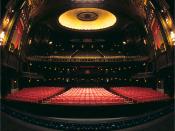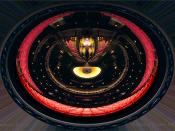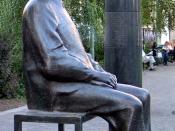Bertolt Brecht was a highly influential figure in the theatrical world. He opposed the aesthetic theatre, believing that the audience must take on a critical and intelligent role, making judgement upon the issues raised in the performance. To achieve this he introduced the "Alienation Effect" where he detaches the audience from feeling identification towards the characters. Many of his ideas were maintained and are now commonly used in modern theatre.
Brecht uncovered "Epic Theatre", a didactic type of theatre that confronts the audience using different entertaining techniques. Brecht was influenced by many different sources (Oriental, Indian, Greek and Elizabethan theatre), he gathered many elements and combined them to make his own. Epic theatre was influenced by the horrors of world political tragedies (such as World War 1 and the great depression) that occurred during the early 1900. It was designed to teach the audience to become suspicious and critical about the injustices and inequalities occurring in their times.
Brecht despised dramatic theatre, where the spectators identify with the characters, disregard their own individuality and move into a "trance-like state". He believed that rather than being passive sponges, the spectators must assume a state of individualism, criticizing and analysing the social issues brought up. He aimed to encourage the audience into adopting a more critical attitude provoking a social change.
Techniques were devised to promote the theory of epic theatre stimulating the spectator's criticism. They were intended to de-familiarize the spectators from the characters and settings compelling them to challenge what is being presented. Two key techniques were developed: "Theatricalism" and "Alienation Effect". Theatricalism basically involved the audience being aware that they are in a theatre watching a play. He believed that by portraying the set up of the play (stage lights) and making it...



Very helpful!!!!
I've got a drama assignment and I'm doing modern theater....after reading this essay..its def helped me a lot with my understanding of Brecht..awesome mate
1 out of 1 people found this comment useful.